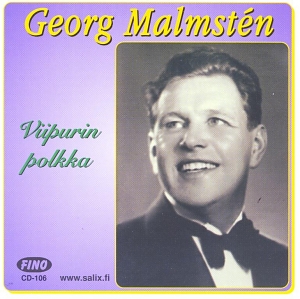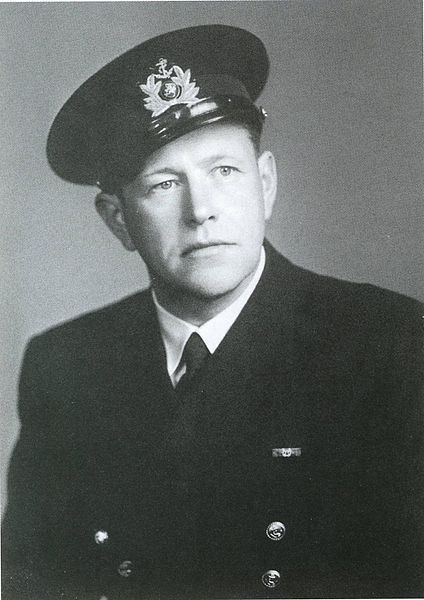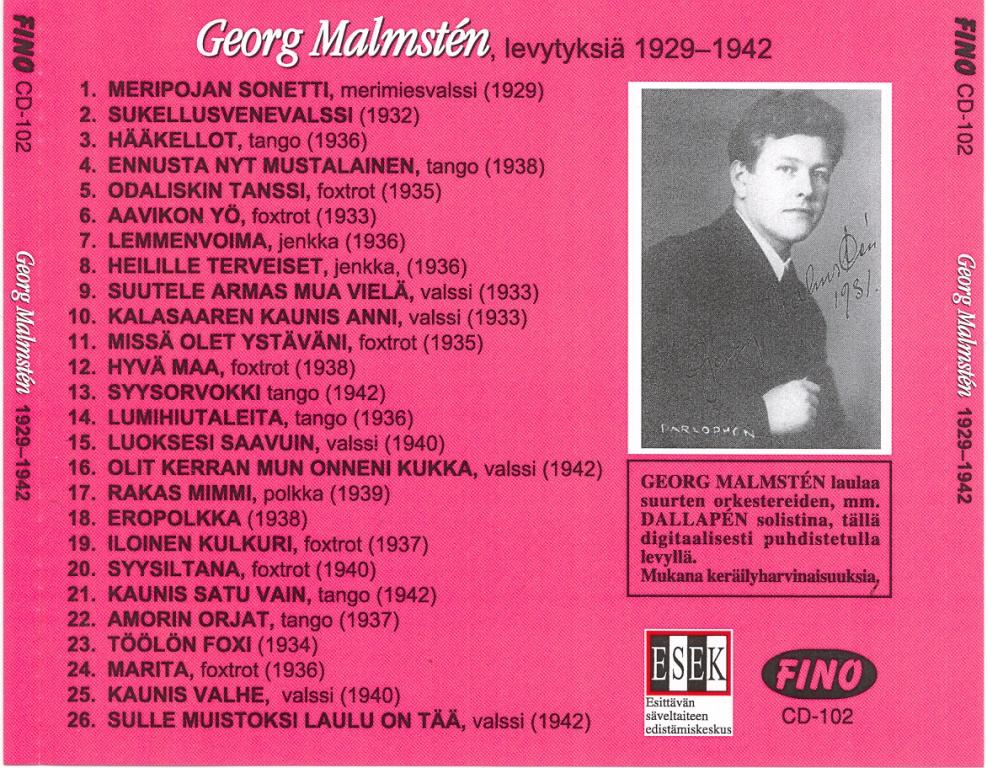Georg Malmstén

Georg Malmstén
Finnish singer Georg Malmstén was born in Helsinki in June 1902. He would go on to become a popular entertainer in Finland and arguably one of the most important influences on Finnish popular music in the 1930’s and 1940’s. As well as singing, he composed music for film, starred in many films, and also directed one film. His brother Eugen Malmstén, his sister Greta Pitkänen and his daughter Ragni Malmstén were also all well-known entertainers. Georg himself began studying music in primary school, then at the Helsinki Music Institute (now the Sibelius Academy). In 1925, Georg Malmstén married Ragnhild Törnströmin (d.1981). They had two children, Ole Malmsten (1925-1981) and Ragni (1933-2002). Around the same time he played with the Navy Band. Towards the end of the 1920’s, Malmstén moved to the Helsinki Conservatory to study singing under Väinö Lehtinen. He also appeared in student concerts.
Malmstén made his first recording in 1929 on a journey to Berlin, where he recorded songs which included some of his own compositions, such as the song “Särkynyt Onni” (Broken Fortune), which sold about 17,000 copies and brought him popular music stardom. Malmstén wrote his songs in Swedish (his mother tongue), with translations into Finnish made by his friend Roine Richard Ryynänen. Malmstén recorded most of his songs in both Finnish and Swedish. Malmstén’s early career seemed to be headed towards classical music – in 1929 he appeared in Handel’s opera “Julius Caesar” and in 1930 he appeared at the Savonlinna Opera Festival where he sang Jussi’s part in the opera “Pohjalaisia.”
Some six months later he gave his debut recital at the Helsinki University Hall following which he was offered a position in Finnish opera, but for financial reasons he could not take the offer because it would have required he forgo pop music (he would have been unable to support his family on opera wages alone). Malmstén focused on sales activities for the record company (Parlophone) he had set up and finally began to perform popular music. In the same decade he became the vocalist for the Dallapé orchestra and also performed in the capacity of the conductor. At the same time, he wrote musicals and also starred in them. He expanded his repertoire to include pop music and became one of the most prolific entertainers in Finland, producing over 800 records in numerous genres. He made about half of his releases under the pseudonym Matti Reima.
When the Winter War broke out, Malmstén was assigned to the Naval Base in Helsinki where his primary responsibility was entertaining the troops. Over the course of the Winter War he performed numerous concerts for troops at the front line, as well as making a number of recordings such as “Äänisen Aallot” (Onega Waves). During the war, with many men in the military and the others working in essential war industries, the recording companies did not have the time to look for new talent or the personnel and resources to manufacture new records. As a result, through 1940 there was very much a hiatus in the Finnish musical industry. Malmstén himself during the war years was perhaps the most recorded of Finnish singers (although other singers such as The Harmony Sisters also made equally dedicated contributions to entertaining both the troops and Finnish civilians). War-time Malmstén classics included “Liisa Pien'” (Lili Marlene), “Tumma Yö” (Dark Night), “Kaunis Valhe” (Beautiful Lie), “Kaarina”, “Pienet Kukkivat Kummut” (Small Flowering Hills) and many others. Entertainment Tours were “välillä vihollisen luotisateessa” as Malmstén himself put it. Malmstén was released from service in late 1945 and made his first post-war album in the same year.
Äänisen Aallot (“Onega Waves”) – sung by Georg Malmstén
This song was widely popular with the both the soldiers on the front and with Finnish civilians. Within the context of WW2 and the Continuation War which Finland fought against the Soviet Union independently of the Germans, this song celebrated the liberation of the ancestral Finnish homeland of Karelia and in particular of Lake Äänisen, the heartland of the Finnish people, from the USSR.
Äänisen Aallot (Waves of Lake Onega)
composer: Georg de Godzinsky, lyrics: Kerttu Mustonen
This version: George Malmstén (1942)
Lyö aallot Äänisen aavan, ne keinuu näin kertoen:
On uuden huomenen saava, maa Vienan ja Aunuksen.
Ne kuuli sorean soiton, min’ taiston temmellys toi.
Nyt joukko horjumaton sen rantoja taas vartioi.
Hiljaa tuutii Ääninen aaltojaan, uupuu rantaan
satujen saarelmaan. Sua kaukaa, armain,
täällä muistelen – kerran noudan
onnemme venheeseen.
Lyö aallot Äänisen aavan, ne keinuu näin kertoen:
Toi heimo Karjalan maahan nyt uuden jo kanteleen.
He kulki voitosta voittoon ja löivät vihuripäin,
siks’ kunnes koskematon ja ihana maa tänne jäi.
****************************
The waters of wide Onega roll, the waves are telling a story:
The lands of Viena and Aunus shall have a new dawn.
A graceful song was heard there, a song brought by fierce fightning.
A steadfast legion is again guarding her shores.
Silently Onega lulls her waves, making them crash to the shore,
the shore of an fairy tale island.
Here, my love, I keep dreaming about you –
someday I will carry you to the boat of our happiness.
The waters of wide Onega roll, the waves are telling a story:
The kin of Finland has brought a new kantele to the land of Carelia.
From victory to victory they roamed, striking like a gust of wind.
Until a beautiful and uspoiled land remained here.
“Pienet Kukkivat Kummut” (Small Flowering Hills) – another war-time song from Georg Malmstén
In the post-war years Malmstén did not make any particularly significant recordings until 1947, when he recorded the well-known songs, “Pennitön Uneksija” (Penniless Dreamer). In the early 1950s he recorded a number of songs that later became classics such as “Stadin Kundi.” He also wrote the song ” Kohtalokas samba”, which became his brother Eugen Malmstén’s signature song. Other famous Malmsten lyrics came from the 1940s are the “Totisen Pojan Jenkka”, “Erokirje Heilille” and the previously mentioned “Pennitön Uneksija.”
“Pennitön Uneksija” (Penniless Dreamer)
In the 1960’s, Malmstén began to hold come-along evenings (vetää yhteislauluiltoja), which resulted in many of his songs being “rediscovered” as it were. He recorded many new versions of past classics. The last time Malmstén made a recording was in 1975, where he sang “Ilta Skanssissa” and “Pennitön Uneksija” for a Dallapé Orchestra 50th Anniversary disc. Georg Malmstén died in Helsinki on 25 May 1981 from a long-term illness. He is buried in Hietaniemi Cemetery (Block H36).

Georg Malmstén in Finnish Navy uniform, WW2 (Continuation War)

Georg Malmstén – hit songs from 1929 to 1942
 Copyright secured by Digiprove © 2013 Alternative Finland
Copyright secured by Digiprove © 2013 Alternative Finland


